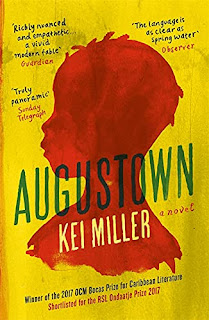Augustown - Kei Miller
There's one story in Augustown that on its own aspires to the mythological and to religious revelation that is central to the people and their history and that's the story of the flying preacherman, Alexander Bedward. In 1920, the preacher announced that on the night of the 31st December he would ascend floating into the skies, walk around in heaven and return to save his people and bring them to Zion. It's a tale that will eventually inspire them towards revolution against the forces of evil but not for a while yet.
The tale is related by blind Ma Taffy sixty-two years after the event and, having been present at it, it's a different version from the official one that Babylon history has recorded. The time for the true story to be told is approaching now however and Ma Taffy can feel it in the air. It might seem like a diversionary story that she uses to stay the shock and anger of a young Rastafarian boy, Kaia, who has had his dreadlocks cut off by his teacher in a fit of anger, but it's rather a story whose time has come full circle. The rash action of the teacher has spilled over into the tensions that already exist between some of the street gangs and the repressive white authorities. The autoclaps is coming.
There is inevitably an air of Magic Realism to the fictionalisation in Augustown of Revivalist preacher Alexander Bedward's attempted ascension in August Town in 1920, but the narrator here would dispute that claim and tell us that the real truth is in the storytelling, not some bald facts that have been distorted to serve a familiar narrative and a specific agenda. The truth is that stories are important, that the story of a flying preacher can inspire hope in a race of people who have lived too long according to the rules and narrative of corrupt authorities, a people seeking to establish their own idea of what constitutes a nation, a people and a religion.
Which still sounds a lot like magic realism, but we'll not argue over literary labels here. Augustown is at the very least just as richly peopled and as imaginatively descriptive of the essence of characteristics that define a nation as One Hundred Years of Solitude, but it has something more of the concision of Chronicle of a Death Foretold in the way that storytelling can explore the question of relative truths and elevate a relatively small but violent incident into something of much greater significance.
In its short tale, Augustown presents a wide view of Jamaican life, from the salons and drawing rooms of the ruling establishment to the reality of life for people in the slums. Its narrative mythologises the power of the told experience - whether it's a nasty racist 'travelogue' that distorts perceptions or a legend that gives meaning and empowerment to an oppressed people - and at the same time finds the truth in the meetings of race and class in the classroom, in an unfortunate romance or at either end of a gun. "The past, when it takes hold of us, does not let go easy".




Comments
Post a Comment